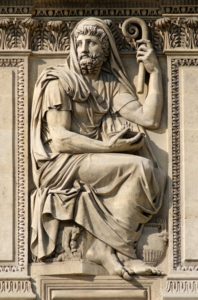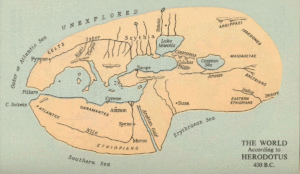Culture and Nationhood in the World of Herodotus: An Evolutionary Analysis, Part 1

Herodotus by Jean-Guillaume Moitte, 1806. Relief on the west façade of the Cour Carrée in the Louvre Palace, Paris.
Herodotus (trans. Robin Waterfield), The Histories (Oxford: Oxford University Press, 1998)
In defense of history, the Roman orator Cicero once said: “To be ignorant of what occurred before you were born is to remain forever a child.” In history, we can find the past trajectory of human events and insights into the nature of human existence in other circumstances, two powerful guides for the future. The first historian was Herodotus, a Greek who lived some 2,500 years ago. His massive Histories are an encyclopedic snapshot of that epoch, an enormous collection of stories on all the nations of the known world which he had gathered during his travels.
Herodotus is a perceptive observer of human nature. His humans are indeed riven with contradictions and subject to extreme pressures, torn between often-conflicting personal, familial, and political loyalties. Herodotus’ is a world of sex and violence, of tribes and cultures. Reading Herodotus remains a rewarding experience, for our human nature has not changed much over the past 2,500 years. I propose an evolutionary analysis of the Histories, highlighting in particular the complex and dynamic relationship between environment, culture, and ethnicity. As we shall see, national identity, ethnocentrism, and the condemnation of decadence — what we would call maladaptive culture — are major themes in Herodotus’ work.
The known world of Herodotus can be seen as a kind of enormous grid centered upon the eastern Mediterranean, where most of the Greeks lived, and the Persian empire, by far the largest and most powerful state of the time. In this vast world, the Greeks were a young people scattered across the Mediterranean “like frogs around a pond” (Plato, Phaedo, 109b). The Greeks were well aware of the other great and often mysterious peoples around them: the Semitic trading-nation of Phoenicia in the Levant, the wild nomadic Scythians in the north, the mysterious Ethiopians in the south and Indians in the east, the massive city of Babylon in Mesopotamia, and the venerable Egyptians, among others.

Herodotus’ world certainly featured peaceful commerce, cultural exchange, and ethnic intermarriage among these peoples — the historian is quite broad-minded and free of chauvinism in this respect.[1] But, as Herodotus makes clear, this was also a world of extreme ethnocentrism and brutal wars. The highly diverse material of the Histories, which features myths, stories, and ethnographic portraits of the many peoples of the known world, is united around the rise and decline of the Persian empire: each people is described when they encounter the Persians, the latter being invariably bent on conquest. The work climaxes with the great struggle of an unlikely coalition of Greek city-states led by Athens and Sparta and their ultimate triumph over the Persian invaders. Meditation on war and commemoration of Greek unity and freedom are thus at the center of Herodotus’ narrative. (Incidentally, I was pleasantly surprised to learn that many of the most iconic lines and scenes in the otherwise unrealistic film 300 are actually directly drawn from Herodotus.)
The Histories provide a snapshot of the ancient world as seen through the eyes of this well-traveled and endlessly curious Greek. Herodotus’ world is one of hearsay, myth, and superstition. In the absence of written documents, knowledge of events in far-away places or even of a few generations earlier was dependent on often highly unreliable and romanticized oral transmission. Thus the stories Herodotus dutifully reports from his various sources are often inaccurate and fantastical. Yet if anything this gives us an even better sense of the mental universe of the Ancients — inhabiting a world which was at once mysterious and full of meaning.
For all that, we can also clearly see in the Histories the beginnings of scientific thought concerning both nature and society, for instance with plausible speculations about the formation of the Nile Delta, micro-climates, and the effect of the natural environment on human biology and culture. Herodotus is a particularly perceptive observer on the role of culture and ethnicity in human societies. In a famous passage, he says that “King Custom” (or King Nomos) rules all human societies, that all these societies tend to think their own customs are superior, and hence that cultural chauvinism is a universal. Furthermore, Herodotus’ stories frequently revolve around the theme of kin-solidarity, both within families and ethnic groups. In another famous passage of the Histories, the Athenians justify their resistance to the Persians on grounds of their Greek national identity, defined by shared blood, language, religion, and custom. This is a powerful working definition of nationhood that is still useful today. Herodotus then shows that compelling ethnocentric sentiment goes back at least the dawn of recorded human history—cultural chauvinism and ethnic kin-solidarity working in tandem.
One can also infer clear cases of gene-culture interaction in the Histories. The cultures Herodotus describes often promote, as an overwhelming imperative, what are in effect evolutionarily adaptive values at both the individual and social levels. Family formation, solidarity with immediate kin, and filial piety frequently appear as supreme ethical and even religious duties. Some customs, such as limiting intermarriage to within certain classes or ethnic groups, lead to the creation of new genetically unique populations.[2] There is extreme concern with suppressing many behaviors we would consider maladaptive, such as contempt for kin and effeminacy.
Selection, it would seem, could also occur at the level of the group. War is a common tragedy between the nations described by Herodotus, frequently concluding in ethnic cleansing in the form of mass enslavement, expulsion, or simple extermination. Entire societies are frequently annihilated culturally and sometimes genetically as well. Herodotus is keenly aware that a people’s culture can either help or hinder their struggle for survival, with cultural practices often being aimed at increasing toughness, group solidarity, and martial valor. He is deeply concerned with luxury, effeminacy, and decadence causing the fall of great empires and nations. From Herodotus’ account, we can surmise that King Nomos—i.e., culture’s influence on human behavior—is clearly powerful enough to affect the composition of the gene pool across generations, and thus the course of human evolution.
I dare say one can even see in Herodotus the glimmer of a general theory of cultural and ethno-national change, with complex and dynamic interaction between populations and cultures, both being influenced by their natural environment. Populations and cultures rise and fall across this world – sometimes interacting peacefully, often violently. Cultural practices and knowledge, especially if useful, may spread among the nations. At times, however, cultures are simply incompatible, such as the Persian custom of imperial expansion and domination conflicting with the Greek custom of civic self-government. Here we witness a clash of nomoi. War is a recurring fact of life, brought about by competition for limited resources, the arrogance of conquerors, or, most often according to Herodotus, the vicious circle of tit-for-tat retributory escalation in which nations start new wars by citing old crimes. (Herodotus for instance tells a story claiming that the Persians’ hostility to the Greeks dates from the mythical destruction of the Eastern city of Troy.) Whatever the causes of conflict, the nations with cultures promoting strength defeat those with cultures promoting weakness. Thus, a strong national-cultural pair spreads together: the weak conquered nations are either exterminated, meaning biological extinction, or subjugated, meaning the end of their cultural sovereignty.[3] Over time, one would expect to see a selection for cultures promoting group solidarity and manliness.
Interestingly, Herodotus sees both nations and cultures as being powerfully influenced by their natural environment. Nature (physis) can both change a people physically and, depending on its harshness, determine the toughness of its culture. This is a major cause of the self-correcting nature of Herodotus’ world: as a strong nation/culture conquers and expands, it tends to become wealthy and arrogant, leading to softness, excess, and thus defeat at the hands of still-virile peoples. This is the recurring fate of the Persian armies, defeated by the Scythians, the Ethiopians, and finally the Greeks.
Herodotus’ discussion of the Ethiopians is a good case study of all these influences between environments, populations, and cultures. South of the Nile, Herodotus says “it is so hot there that the people are black” (2.22). The Ethiopians’ culture was also changed by the settlement of Egyptian soldiers in the area: “As a result of their living there, the Ethiopians have learned Egyptian customs and become less wild” (2.30). According to Herodotus, a Persian army invading Ethiopia met its doom starving in the barren desert, the hardy Ethiopians remaining free.[4] By this example, we can see the world of Herodotus as one of evolving peoples and cultures, interacting and conflicting with one another, all under the influence of nature.
End of Part 1
[1]Herodotus says for instance on religion: “Because I believe that everyone is equal in terms of religious knowledge, I do not see any point in relating anything I was told about the gods” (2.3).
[2]A common example of this was limiting marriage to members of the in-group and limiting citizenship to those born of such unions. Herodotus claims that at one time Egypt was divided in twelve allied kingdoms whose royal families exclusively married with one another. He also says that Egyptian swineherds were only allowed to marry within the families of other swineherds. Over time, such populations would then become genetically distinct populations with different phenotypical characteristics. The most extreme examples of such limits on intermarriage in ancient times appear to have been those practiced by the Jews and the Hindus.
[3]Few peoples, it would seem, have the natural ability to maintain their identity and way of life across the centuries as a non-ruling minority in other nations. One thinks above all of the Jews and the Gypsies.
[4]Herodotus’ discussion of Black people generally is worthy of comment. Herodotus uses the term “Ethiopian” to refer to people of color in general, both African and Indian: “The eastern [Indian] Ethiopians have straight hair, while the Libyan [African] ones have curlier hair than any other people in the world” (7.69). Herodotus describes the Egyptians as dark-skinned and curly-haired (2.104), but distinguishes between them and Ethiopians, saying 18 of 330 historical pharaohs were of Ethiopian origin (2.100).
Herodotus’ discussion of Ethiopians is sometimes realistic, clearly referring to real peoples, and sometimes fantastic, following the mythical descriptions of “Ethiopians” described in Homer, as a semi-divine people on the edge of the world, as unreal as the Hyperboreans (Iliad 1.423, 23.206; Odyssey 1.22, 5.282).
On the mythical side, Herodotus speaks of certain Ethiopians as the “tallest, best-looking, and longest-lived men in the world” (3.114). Elsewhere, Herodotus speaks of fleet-footed cave-dwelling Ethiopians who eat reptiles and squeak like bats (4.183). In between myth and reality, there are reports that possibly refer to Pygmies. Libyans are said to have crossed the desert and encountered “small men of less than normal human stature . . . [who] had black skin” (2.33). Carthaginians who claim to have circumnavigated Africa say that during their travels they discovered “a country inhabited by small people who wore clothes made out of palm leaves” (4.43).





Comments are closed.